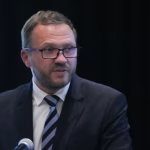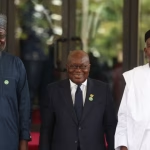DAMASCUS —
Students across Syria returned to classrooms on Sunday, marking a symbolic step toward normalcy under the country’s new leadership. This comes just a week after rebels seized the capital, toppling President Bashar al-Assad in a dramatic turn of events that ended his 13-year rule.
The new leader, Ahmad al-Sharaa, faces monumental challenges in rebuilding a nation devastated by years of civil war, which claimed hundreds of thousands of lives, destroyed infrastructure, and displaced millions.
Schools Resume Despite Uncertainty
Schools across the country were ordered to reopen, signaling a push for stability. However, lingering uncertainty kept some parents from sending their children to class.
At the Jawdat al-Hashemi boys’ high school in Damascus, students gathered in the courtyard, watching as the new national flag was raised by school secretary Raed Nasser.
“Everything is good. We are fully equipped. We worked two, three days to ensure the school is ready for the students’ safe return,” Nasser said, adding that the school remained undamaged despite the conflict.
In one classroom, students helped decorate with the new flag. Salah al-Din Diab, a student, expressed relief. «I am optimistic and very happy,» he said. «I used to be scared of being drafted into military service or stopped at checkpoints. Now, that fear is gone.»
Rebuilding Amid Diplomatic Uncertainty
The aftermath of Assad’s overthrow has left Syria navigating a precarious path to reconstruction. Neighboring countries and global powers continue to assess their approach toward the new government, led by Ahmad al-Sharaa, better known as Abu Mohammed al-Golani, the leader of the Islamist group Hayat Tahrir al-Sham (HTS).
HTS, previously aligned with al-Qaida, remains designated as a terrorist organization by many countries and is subject to United Nations sanctions. Despite this, the group has taken charge, promising a new era for Syria.
Calls for Sanctions Relief
The United Nations’ envoy to Syria, Geir Pedersen, expressed hope for an end to international sanctions to facilitate economic recovery. «We will hopefully see a quick end to sanctions so that we can rally around rebuilding Syria,» Pedersen stated upon his arrival in Damascus to meet with the caretaker government.
The international community, however, remains cautious. Diplomats from the United States, Turkey, the European Union, and Arab nations convened in Jordan over the weekend. They emphasized that Syria’s new government must respect minority rights and adhere to international standards.
A Nation in Transition
Syria’s future remains uncertain as its new leadership works to restore stability and address the immense humanitarian and economic challenges left by the conflict. While reopening schools is a promising sign of progress, the path to rebuilding trust domestically and internationally will be long and complex.
Descubre más desde Polimatía TemisEdu
Suscríbete y recibe las últimas entradas en tu correo electrónico.


